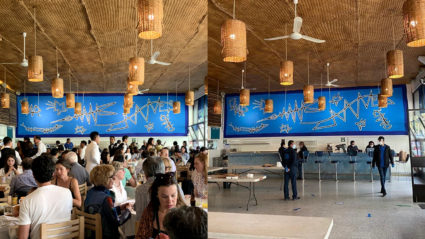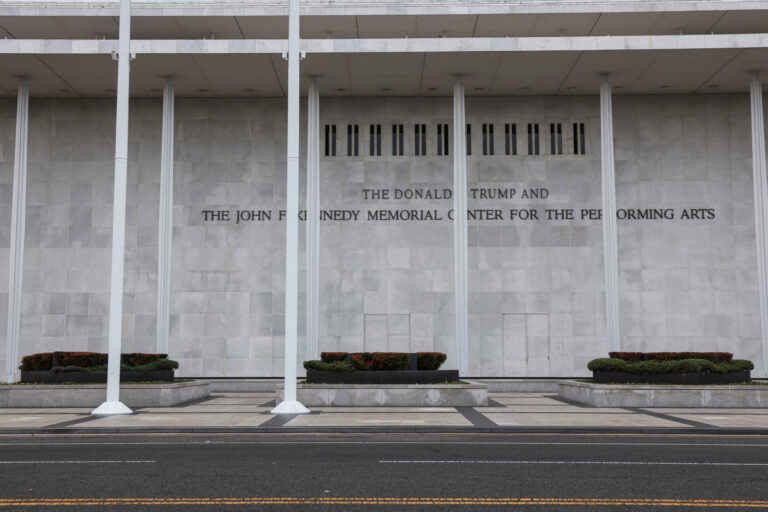
How chef Gabriela Cámara had to adapt her restaurant for the pandemic
Before the pandemic, chef Gabriela Cámara's restaurant Contramar was bustling with cooks and customers, its tables set close together, underscoring a guiding principle for Cámara and Mexican culture at large: enjoying a meal means enjoying your company. As waiters brought fresh tortillas and small bites and grilled fish, crowds would linger even after emptied plates and used napkins had been cleared.
When Cámara first opened her Mexico City restaurant more than two decades ago, she wanted to mimic the energy of a palapa, a relaxed, open-air seaside hangout.

But these days, Contramar has had to adapt for the coronavirus pandemic, like countless others in the restaurant world. In an industry that already has notoriously small profit margins, enforced measures like lockdowns and social distancing affect a restaurant's capacity to have dine-in customers, and less foot traffic means less revenue to remain open. The well-being and safety of the workers must be considered too, because losing a job means also not having the ability to pay rent and other bills that haven't stopped in the middle of a global health emergency.
In Mexico City, restaurants have closed, reopened, closed and then partially reopened again throughout the pandemic. The city of more than 21 million people is a global destination for tourists who come for the culinary and artistic delights, but COVID-19 has hastened the closures of thousands of restaurants that contributed to its vibrant pulse. And sales have plummeted for more than a million street food vendors, who have been struggling to stay afloat during the crisis.
"It's difficult for restaurants to survive without being open, even at a reduced capacity," Cámara told the PBS NewsHour's Jeffrey Brown. "Not every restaurant has had the capacity to do takeout or delivery because it requires resources." Cámara, who is on the Mexican government's Council of Cultural Diplomacy, said Contramar has been lucky, so far.
When a citywide ban on in-person dining were kept in place on Jan. 11, some restaurant employees banged pots outside in protest of the restrictions. City officials wanted to extend the ban amid an escalating death toll in Mexico City. Eventually, officials relented to restaurants serving customers in their outdoor dining spaces, but some restrictions remain.
A Contramar employee preps vegetables for the day's orders. Video by Julia Galiano-Rios and Susana Seijas
Inside Contramar, the daily rhythms have changed, but the staff stay busy filling online orders. Cámara, who also owns another restaurant in San Francisco called Cala, turned to Instagram to show how she prepared tuna tostadas, a signature dish. Amid the latest restrictions, Contramar has opened outdoor dining as well.
The NewsHour spoke with Cámara at the tailend of the city's partial lockdown order that was meant to end on Jan. 11. She spoke about the challenges of keeping a restaurant open amid the pandemic, and whether she feels the fallout will have a lasting impact on the country's food scene.
This interview has been edited for length and clarity.
Take me back to when the pandemic started. What was the feeling? Was it frustration? Was it determination? What happened from the beginning?
It was a lot of uncertainty. [You and I] spoke, and about a month later, even less than a month later, we were in this situation that nobody could actually really predict. If we would have been more savvy and more conscientious, we would have known that we were going to get it, that it was going to get to us. But given the circumstances, and how sort of short-sighted, near-sighted humans are, and how we are just always counting on our routines, I guess it was difficult for everybody to predict the huge wave that was coming.
We, from one day to the next, started panicking about — you know, cases of spread and Contramar, with so many foreigners and so many people from everywhere in the country, and it was very sudden. And it was both a call to action and wanting to hold it together and do the right thing and keep everybody safe, and on the other hand, just really not knowing what the best thing to do would be.
In the months since, what kind of things have you tried? What's worked for you? What kind of new creativity, perhaps, has this brought about?
In restaurants, we are very used to the safety and health protocols that we now all have to follow. So that one is not our main challenge. The main challenge was to sort of readjust our teams so that we would have more contained groups, in case of the spread of the virus. We just wanted to make sure that we didn't have to be testing everybody every week. So we divided the team into different groups of five. And then those groups would travel together to the restaurant. And we started working on takeout and delivery. And the restaurant was closed for almost two months before we made sure that everybody was safe and that no case had occurred in anybody's family. And then, when we knew that everybody was safe, everybody tested again. They came to work. And we had takeout and delivery, and that was good practice until we finally could open. In Mexico City, restaurants were allowed to open at the end of June, beginning of July. That was a relief, somewhat, and we had a controlled reopening. It was 30-percent occupancy and then it went up to 40-percent occupancy, and then it went up to 50-percent occupancy. And then we went back to lockdown, which is how we are now.
I guess the thing we've most learned is to always be able to adapt, always be able to get on with the circumstances. We really have had to struggle in ways that we never imagined. But on the other hand, again, in restaurants, we are used to being super attentive to all these health issues and cross contamination and hygiene measures. And I guess now, we're just all going to be much more careful. And it's just something that's arrived to stay with us.
I remember when we talked at your restaurant in Mexico City, before the pandemic, you were telling me about the kind of energy and creativity it took to launch it — to kind of rethink where the food comes from, where you get it, how you serve it freshly. I'm wondering if this moment tapped the same or required a similar kind of determination and creativity.
It really does require a lot of determination and creativity to reimagine restaurants under these circumstances. And I think one of the really challenging things in Mexico is that people live day by day. And our staff had savings, and we have always sort of promoted saving money, but not enough to be able to actually live at home or stay at home for more than a month. So it was really challenging to imagine ways in which to be safe, but also to have people being active, economically speaking, and productive. I guess it was sort of the situation for everybody in the country. But in restaurants, one is also challenged by circumstances, for example, from farmers who just have crops that need to get out. And what do you do with crops that can't wait? That doesn't even have to do with savings. It has to do with just the normal cycle of how things work or how things evolve. And then we had to come up with ideas and ways to use different produce. And fortunately, there was a lot of need to prepare meals for hospital workers, for families of people who came to the city to be hospitalized, for just the regular feeding facilities that we have in the city. So that was a way in which we were creative, just sort of organizing what people could be eating from the crops that were not consumed by the regular market.
And then, in terms of our own teams and the organization and the operations, we just have had to come up with so many different ways to keep safe. And also, in terms of socializing. Mexico is such a socially active population; it's been very difficult to tell people not to go to their religious festivities. It's just brought us all, I guess, to think about how we live and what we focus on in very different ways. And I guess, in the end, one can be very positive and say, "Well, we're learning how to live in different ways, and we're going to be safer. And in the end, this is the natural course of humanity, is to keep on learning or to constantly adapt." And yes, of course, I think that, but also it's been very stressful and it's been very difficult.
Do you see lasting impacts on the restaurant industry, and also on the farmers, the fishermen, the suppliers that you've long worked with? Is that disrupted for the long-term?
For sure. In the worst of cases, some of these businesses have had to shut down. But on the other hand, we've learned how to be much more conscious about the responsibility we have as a restaurant. We're preparing food that people are going to put in their bodies. We need to make sure that our food is as clean as it can be. And I'm not saying "clean" just in the ideological term. I mean, truly, truly clean food in every way. And I think one of the silver linings of this pandemic has been that we actually have all needed to really be critical about how we're eating and what we're eating because we realize that, in terms of health, it has a humongous impact. I guess that's one of the positive consequences.
On the other hand, the losses are what's really difficult to think about, in terms of a future with so many of the restaurants that we had just not existing. And we still haven't seen the end of this. I don't know. But certainly the circumstances today and 10 months ago when we spoke were dramatically different in the city in general. In our neighborhoods, in the city, you see very few people out and about, when Mexico City was all about interaction and visiting and being able to go places and travel and get on the public transportation and go to neighborhoods to explore. And now it's just, everything has changed. Our socializing has really been hit in a way that it never had before.
I'm also thinking even more broadly about the culture in general, because when we talked, you were talking about food as being such an important part of Mexico's culture that the world was discovering in so many new ways. Do you worry about about that?
No, I don't because, fortunately, our perception of food has been so changed by social media and, in general, technology. I think one of the great things about this pandemic has been that people have had access to many more recipes and cooking traditions online than ever before. In that way, the promotion of food or the knowledge of Mexican gastronomy has far from stopped. I think it has become much more known to the world, much more known to both home cooks and professional chefs, but I do believe that in terms of the industry as sort of a driving force for tourism, it's definitely in a halt. It's definitely not being what it used to be. In the months that we did open the restaurant, at a reduced capacity before Dec. 19 when they were shut down, we did receive foreigners, especially at the end, coming back to Mexico for food. But I don't think we're going to be able to open for a few weeks, at least, maybe even a few months. We'll see.
You were talking earlier about using the food to help those most in need. And I saw your San Francisco restaurant was doing that as well. And I also saw that you were named one of Time's most influential people in 2020. Congratulations on that. And I saw that José Andrés, who I've talked to about these issues several times, wrote about this whole issue of how to use restaurants, how do we rethink the ways of reaching people most in need.
This pandemic has just brought it to more people's attention because we truly have been pressed by these issues for years or decades. The pandemic has just made it more obvious that we all really need to focus on them. We need to do the most we can for the resources to arrive to whomever needs the most.
What's been the food that has been most meaningful to you now?
I tend to go to pastas, and I tend to make pastas with different things than I have. And again, we were talking about using up vegetables and crops and fish, or foods that had a market before that have sort of lost that. The recipe that I've been cooking the most has been fresh tuna pasta with tomato and a little bit of capers — very Italian — but also everything has been locally sourced in Mexico City. As you know, we have a very generous climate and we have most crops year-round. So tomatoes we can find all the time. I think it's been very important for everyone — everyone that I have access to speaking to — to have the sort of food that is comforting. There's been a huge thing about comfort food and what is comforting. I guess, in many ways or in many cultures, food that is a mix between known carbohydrates and a little bit of vegetables and a little bit of protein and, in many cases, a little bit of fat, in the way of cheese, of bacon, of lard — these are just combinations at work throughout of the culinary traditions and cultures. And that happens to be very appreciated by most humans under stressful circumstances.
Another thing that I always go to are tortillas with different things, and I have always sustained that you can make a taco with anything. So as long as you have fresh tortillas, you can put anything into it. And that's a lot of what we've done cooking at home. I've been very taken by how people have gone to their family recipes and to their backgrounds in this pandemic. And again, when we were talking about the silver lining of this, I think that's one of the silver linings to sort of appreciate the simplicity of of the foods that we grew up with or the foods that we have access to in our surroundings and not expect to have a great meal only when one can go out to a fantastic restaurant or when one can import things.
I take it you're very eager to get back and reopen the restaurant.
I am. But we'll see. We'll see when that happens. There's a whole movement in Mexico. There was the lockdown of the city was from Dec. 19 to [Jan. 11], they had said, but the head of the government in Mexico City, Claudia Sheinbaum, came out and said we can't open because the circumstances don't make it safe enough for us to allow normal activity to continue, even at a reduced capacity. So they urged us all in the restaurant business to keep on lockdown. And I said with a very heavy heart, because it's difficult for restaurants to survive without being open, even at a reduced capacity.
I think that one of the extraordinary things about this time is that we will have to find ways in which to make solidarity a real treat among the restaurant community, because it's everybody, so much striving to make it individually that we're needing to find ways in which to support each other as an industry. So I hope that we can do it because it doesn't sound safe to reopen, and it makes no sense to reopen if people can't go to the restaurant anyway. So, you know, it's sort of a Catch-22: You open and then who goes? You don't open, and then you are for sure not having anybody. So I don't know. We'll see what happens.
"Beyond the CANVAS" showcases some of the nation's leading cultural creators — musicians, playwrights, comedians, among many others — who show us how they turn their visions of the world into art. Watch the new season, starting Tuesday, March 23, on PBS or streaming on artscanvas.org.
Support Canvas
Sustain our coverage of culture, arts and literature.




















